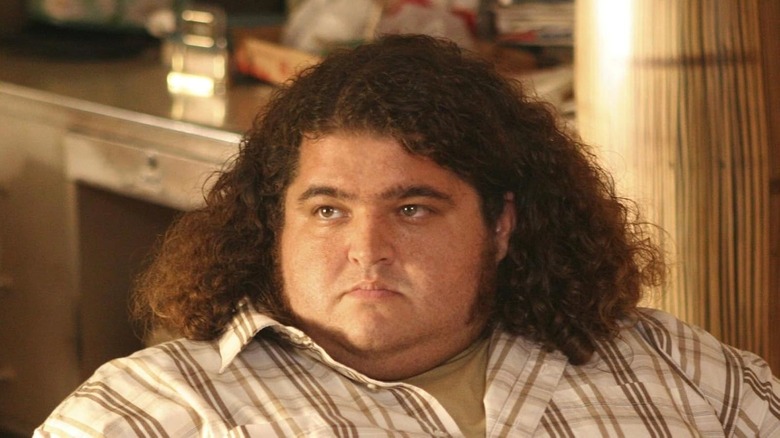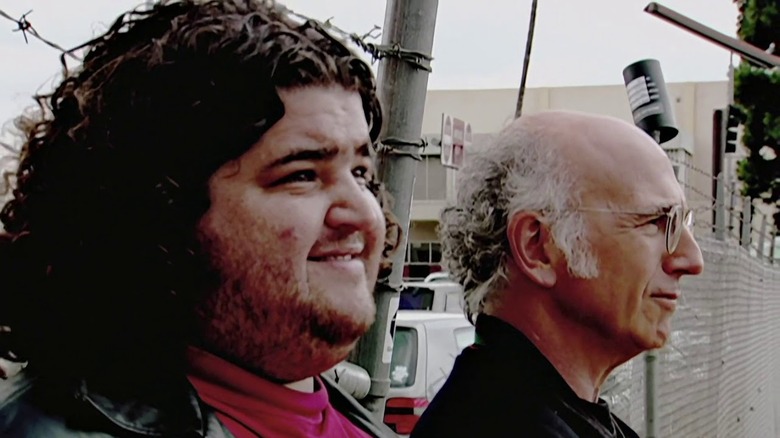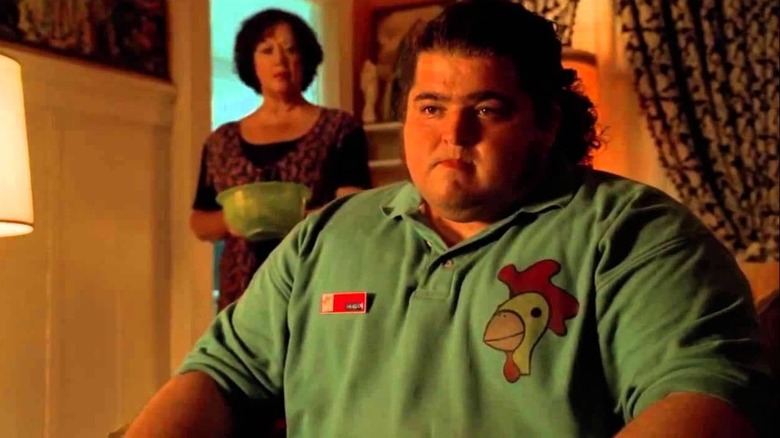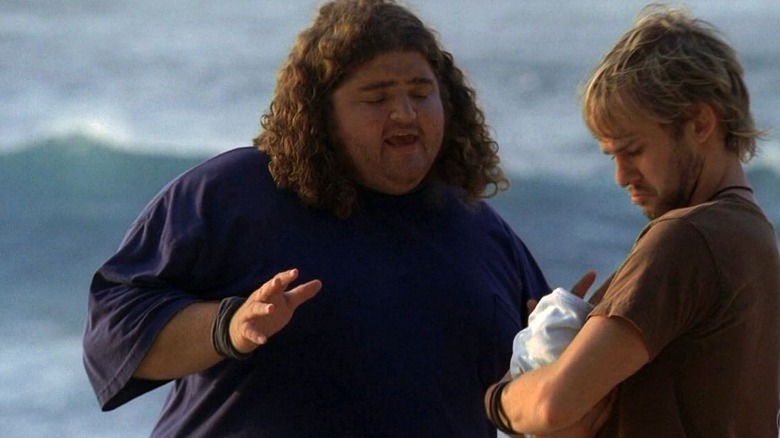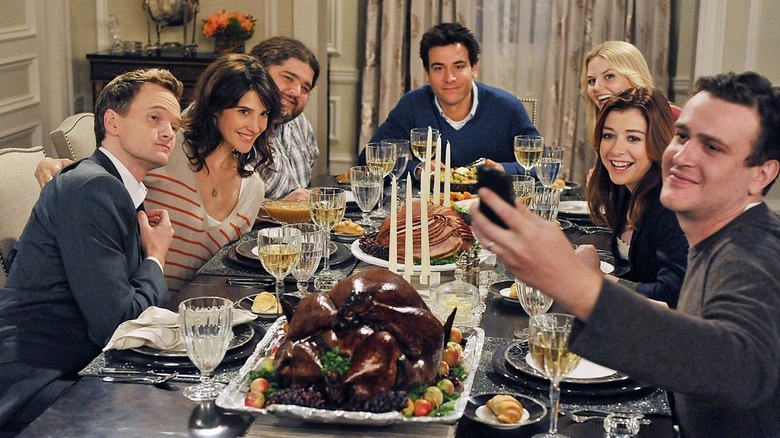Jorge Garcia Got His Lost Role Thanks To A Very Different TV Show
There's a lot of reasons "Lost" was so successful, but a big one was Hugo "Hurley" Reyes (Jorge Garcia). He's one of the few survivors on the show who gets along with pretty much everyone; he doesn't have a mean bone in his body, except of course when Sawyer tries to make fun of his mental health. Hurley's a sweet and loyal friend, and he's funny in a way that rarely seems to boil down to an easy fat joke, which 2000s-era TV loved to indulge in.
Of course, Garcia doesn't always play a nice guy. Before "Lost" aired, he starred in a season 4 episode of "Curb Your Enthusiasm," playing a straight-man drug dealer for a nervous, awkward Larry David to bounce off of. Garcia's character here is still funny, but more because of how jaded and tired he is. He's only in the episode for one scene, but he makes a strong impression, so much so that it caught the "Lost" creators' attention. In a 2014 interview, showrunner Damon Lindelof explained how J.J. Abrams, who directed the pilot, put Garcia on his radar:
"There was a scene on 'Curb Your Enthusiasm' where Larry David has to buy pot, and he buys it from Jorge Garcia, and the morning after that episode J.J. was like, 'We've got to get that guy on the show,' and I was like 'To play who?' Again, at that point I think it was just an outline, and maybe we were starting to write a script, and J.J. was like, 'I don't care, he needs to be on this island. He's hilarious.'"
How the writers came up with Hurley
Sure enough, the creators got Garcia to audition, although it took them a while to figure out what to do with him. In a 2024 interview with the LA Times, Garcia explained some of that early confusion:
"There was a breakdown with a character called Hurley, and he was listed as something along the lines of a 50-year-old redneck. [Laughs] I remember specifically reading in the description that he was described as a 'redshirt,' which I'm guessing meant that he wasn't going to survive the pilot. But they called me in, and the only material they had for the guys were Boone (Ian Somerhalder) sides and Sawyer (Josh Holloway) sides, so they had me read the Sawyer sides."
The redneck characterization makes sense; the show's resident redneck Sawyer was originally supposed to be more of a city guy before Holloway's audition changed the writers' minds. It seems like the showrunners always planned to have at least one redneck character, and once Sawyer was figured out that meant Hurley needed to be something else.
Soon, one of the series' writers came up with the backstory of Hurley as "a repo man who was just so charming and good at his job that people would just end up giving their stuff back," but that too was changed early on. "It didn't end up being his back story, but it's funny how certain ideas still made their way into the show," Garcia said, "Like when Jack (Matthew Fox) doesn't want people to know he's a doctor, he says he's a repo man."
It was nearly halfway through season 1 when Garcia finally found out, from Lindelof, what Hurley's first flashback episode would be about:
"Then Damon [Lindleof] called me and told me that Hurley was a lottery winner, and was actually really rich. I remember thinking, 'Cool, but where's 'The Twilight Zone' part of this?' And finally, I got the script of the episode, and that's when I got the reveal of the numbers."
Letting Hurley be serious was one of the show's best moves
The numbers storyline with Hurley was fascinating because it is, on the surface, kind of a silly idea. Hurley being chased around the world by a scary sequence of numbers is reminiscent of that ridiculous 2009 short film "The Horribly Slow Murderer with the Extremely Inefficient Weapon," where the poor main character is stalked for years by a murderer using a spoon. But "Numbers" is genuinely unnerving, and Hurley gets to give his first real dramatic performance on the show as we watch him mentally deteriorate thanks to his need for someone, anyone, to acknowledge that he's not wrong for believing the numbers are a curse.
Season 2 deepened Hurley further with the dive into his mental health issues, which started long before he noticed the numbers — not to mention his tragic romance with Libby (Cynthia Watros). "To get to have a romance, even as tragic as it ended up being, is just not the kind of thing that a character like mine usually gets to do," Garcia said. "Hurley is not the type of guy who gets to have a kiss on top of a cliff top, so I just never expected to get to do that."
The biggest shock for Garcia, however, was just how important Hurley turned out to be in the end. Not only did he survive six seasons in a show that famously wasn't shy to kill off major characters, but he also ended up becoming the caretaker of the entire island. As Garcia explained:
"I was really moved because it was such a huge reward for his whole journey to get to do that. To have the island handed over to him? I wasn't expecting that at all. This was Jack's story. It starts with his eyes opening, and ends with his eyes closing. It always felt like he was the sun and we were the planets revolving around his experience. So to have Hurley step up into that role — I don't know, I'm grateful that they did it one step at a time because just sitting back and thinking about it, if they had explained this as his arc, it would've been unfathomable."
Hurley's comedic role in Lost was arguably just as important
As compelling and important as Hurley became on "Lost," the comedic element that Abrams picked up on stayed with him long after Abrams himself stopped being involved with the series. For the first three seasons, Hurley and Charlie (Dominic Monaghan) were the show's best comedic duo, only replaced in season 5 by Hurley and Miles. Hurley bounces well off of pretty much everyone though, from Sawyer to Sayid to even baby Aaron. He's a chill guy who's unflinchingly kind and optimistic, making for a fun contrast with everyone else's angsty, intense ways.
Garcia's other theory for why Hurley was so funny and beloved: he was basically an audience surrogate. "He would be the one asking, 'What's that in the woods shaking the trees?'" he said. "Later, when things started getting more complex, they wrote that scene where Hurley is trying to understand time travel on the island, and they're just getting frustrated trying to explain that to him. [Laughs] So I think that role kind of endeared him to the audience, and a lot of people gravitated toward him because of that."
Lindelof, meanwhile, found Hurley funny because his troubles with the numbers felt like something from a much more lighthearted show. "I always remember thinking of like, the Hawaii episodes of 'The Brady Bunch,' where that tiki doll makes Greg wipe out. Just like he can't ditch this thing. It keeps turning up," Lindelof explained. "The fact that Hurley was off living in this total episode of 'The Brady Bunch' while all the other characters are in the show 'Lost,' we always thought was immensely entertaining."
Garcia's post-Lost roles have been mostly comedic
Just as it was a sitcom that helped Garcia land his role as Hurley, "Lost" ended up landing him a bunch of comedic roles. Throughout the 2010s, he'd stop by for an episode or two in shows like "BoJack Horseman" and "Phineas and Ferb," and became a fun regular character on the "Hawaii Five-O" reboot. Indeed, one of his most notable guest roles came in "How I Met Your Mother," where he's introduced in season 6's "Blitzgiving" as the gang's longtime friend Steve Henry (aka The Blitz).
Much like Hurley, the Blitz has been cursed throughout most of his adult life. Except, instead of a sequence of numbers ruining things for him, he's cursed with the perpetual experience of missing out on cool things that happen to his friends. Blitz compares the experience to being trapped on an island, and when the gang is trying to figure out a random phone number for Marshall to dial, Blitz suggests "4-8-15-16-23-42." There's even a fun fan theory that the Blitz was part of the gang since day one, hanging out with them regularly; it's just we never see him because he's always absent whenever anything interesting happens.
The constant "Lost" references weren't just a funny meta gag; they also allowed the "HIMYM" writers to play around with the same basic concept of a cursed man. They seemed to understand that Hurley's storyline is indeed really funny once you get rid of the "Twilight Zone" tone to it, and gave Garcia the chance to embrace the concept under a straightforwardly comedic lens. The result is one of the best episodes of post-golden era "HIMYM," and a delightful treat for "Lost" fans everywhere.
